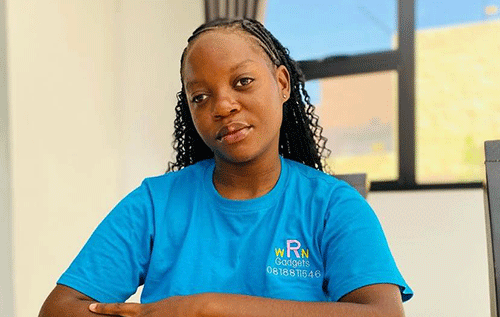In Namibia, conversations about bullying often remain in the shadows, rarely discussed unless tragedy strikes close to home. Sandra Nakashole, a 21-year-old third-year student at the Namibia University of Science and Technology (NUST), said silence is no longer an
option.
From her earliest school days, she has been subjected to both physical and cyberbullying, targeted for something beyond her control, the way her eyes looked.
“Ever since I was in primary school, people would make comments about my eyes,” she recalls. Some would ask why I was born like that. Others would say, ‘look straight at me,’ as if I wasn’t already trying to,” she recalls.
But what started as hurtful teasing turned into relentless bullying. By high school, the mockery had intensified. People would laugh at her, talk behind her back, and there was even a girl who wouldn’t sit next to her just because of how her eyes looked.
The constant judgment forced her to retreat into herself. When she started university, she found it hard to connect with others.
“I could still feel how people looked at me, like I was different and they were better than me,” she said.
In February 2024, Nakashole made the courageous decision to reclaim her narrative. She began posting videos and pictures of herself on social media platforms like TikTok and Instagram, a move meant to build confidence and express self-love. But the internet, too, proved harsh.
“People left negative comments. They told me to ‘look straight into the camera,’ and said things that cut deep. But I kept posting. I told myself I wouldn’t stop. But eventually, the hate started breaking me down,” she said.
Every night, she cried herself to sleep. She felt like she wasn’t pretty enough. Like she didn’t even deserve to go outside.
That emotional weight pushed her to make a life-changing decision. In March 2025, she underwent eye surgery a personal choice she had considered for months. She noted that people close to her didn’t support the idea at first, but she convinced them it was what she really wanted. It wasn’t about changing for others; it was about healing for herself.
Her journey to surgery began in August 2024 with medical consultations and tests. This decision was a turning point in her mental and emotional healing.
Nakashole is now speaking out to help others who are suffering in silence.
“Cyberbullying and physical bullying are real problems in Namibia. They are often overlooked until it’s too late, until someone breaks down or worse,” she said.
She hopes to launch a national campaign to raise awareness about bullying and its impact on young people. Her goal is to visit schools across the country, sharing her story and encouraging others to speak up and seek help.
“There are so many people going through what I went through. I want them to know they’re not alone. That their pain is real, and it matters,” she added.
Psychologist Shaun Whittaker said bullying is an important topic, and bullying is a real problem in Namibia and has not been addressed effectively.
“We have a big problem in schools when it comes to bullying, and cyberbullying makes it worse. It really amplifies the problem and it’s always noticeable. It makes sense given the background of racism in Namibia and racial discrimination, and the main bullying is the physical features,” he said.
Whittaker noted that bullying has a huge impact on primary, children in terms of self-esteem, identity issues, and they struggle with this as teenagers and sometimes into adulthood as well. Unfortunately, in this country, this has not been addressed and there are very effective strategies against bullying, but also broadly, against racism and racist behaviour that still continue in these different forms.
“It certainly for me as a psychologist is of great concern, especially at the primary school level. We need to be protecting our children, we need to help them cope with the teasing. I mean the main form of bullying is definitely the teasing, and yes of course it’s about some physical feature. Like I said, with Namibia’s very violent history based on racism, the teasing, the bullying is usually around that,” he said.
Bullying makes people feel inferior, it makes people feel insecure that they are not good enough, they are not living up to a certain standard of how people are supposed to be, and they do struggle tremendously with self-esteem in high school when they become teenagers.
“I think for us as psychologists, it requires a lot of work around self-esteem building for people to understand that your characteristics as a human being are far more important than those physical features.
And the challenge of course is to help teenagers, young people, to see their own positive characteristics, see their own strengths as human beings because we all have them, you know, and I very often challenge the teenagers to come up with a list of 10 positive characteristics they see in themselves,” he said.
-pmukokobi@nepc.com.na


